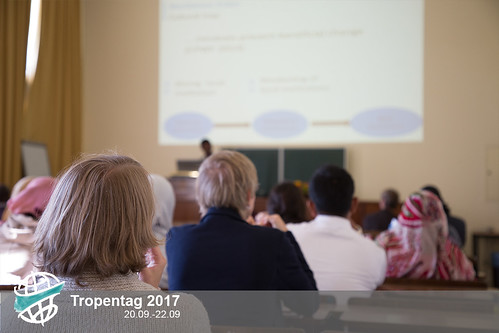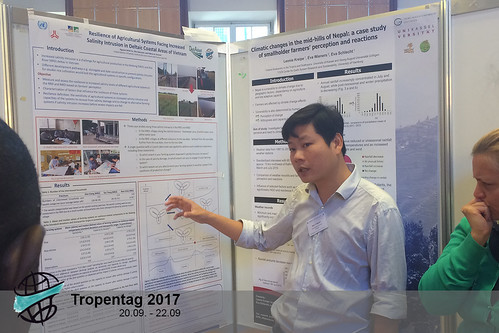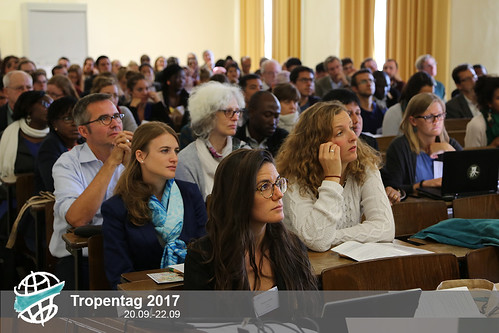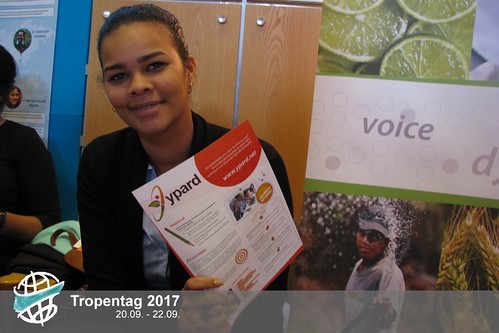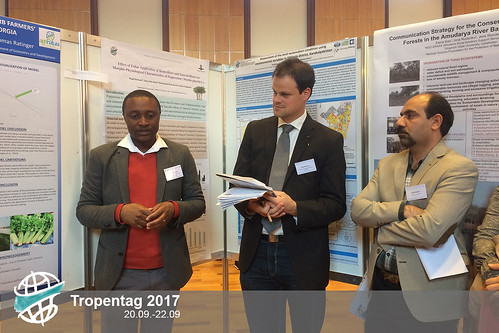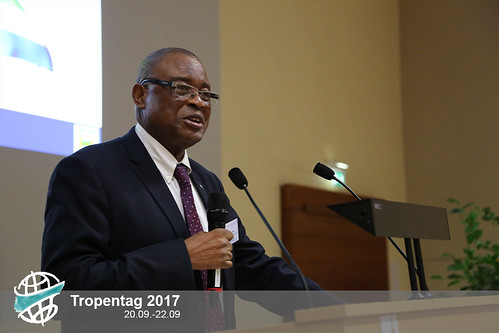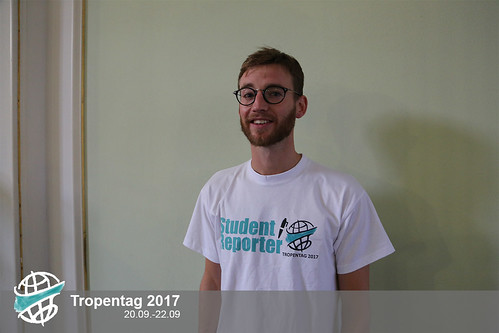Hana Khanh's blog

Value Chains are Valuable
Fri, 09/22/2017 - 11:38 — Hana KhanhValue chains is the hot topic currently in agricultural economics. As a result, not surprisingly, many people came to the poster session, although it was organized very late in the afternoon of the second day, just before the biggest event of the conference, the "Gala dinner’’.
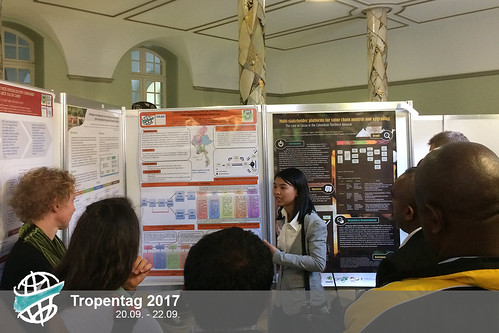
This year, there were up to 15 posters registered, and they had only one hour to present their work. I felt very positive as I learned about the many attempts to find the bottlenecks in the value chains of tropical and sub-tropical products in developing countries, perhaps leading to new suggestions and solutions for farmers. While Sham UI Haq and Yee Mon Aung worked on rice and pulses in Myanmar, Hazal Akcakara from the University of Bonn, evaluated the impact of sustainability certification on palm oil.

Attention: Bring your research closer to farmers!
Thu, 09/21/2017 - 17:01 — Hana KhanhIn order to increase the productivity of potatoes in Rwanda, researchers created new certified seeds (formal system) to replace the commonly used, low quality and low yielding seeds (informal system). However, unfortunately, Leone Ferrari and her team found that certified seeds are still underutilized.
While conducting her research on four of the most productive districts in Rwanda for potatoes, Leone Ferrari realized that farmers using certified seeds represented only around 5% of the national required demand. Producing certified seeds in Rwanda is necessary, but is still not enough.
She insisted that the formal and informal systems of potato seeds in Rwanda must be complementary and mutually dependent. She recommended developing strong linkages with farmers to distribute certified seeds.
In the end, it comes back to the fundamentals, a close relationship with and awareness of farmers. Hopefully, her research add urgency to the need for experts, researchers, policy makers to put more effort in bringing their research and work closer to the farmers.

Diverse Approaches to Understanding Farmers’ Perception
Thu, 09/21/2017 - 14:19 — Hana KhanhStarting very early in the morning of the second day of Tropentag 2017, the poster sessions on Risk and Awareness still attracted many people. It is good news that this year many presented research focused on understanding the farmers’ perception through different approaches. It also made the session more interesting with lots of discussions.
While Akary Min investigated how farmers adapt to climate change in the Central Dry Zone of Myanmar, Amie Heri-Kazi Bisimwa from Eastern of DR Congo was more inclined towards the farmers’ perceptions of land degradation in South Kivu. And Minh Tu Nguyen has been currently working on the subjective measurement of resilience of agricultural systems to increased salinity intrusion in Vietnam. More surprisingly, Emily Mutota tried to apply a new method, ‘’photovoice’’, in which she attempted to understand the perception of the local community about their own habitats by asking them to expressing it through the photos they captured. Even though, personally, I was not able to find many promising results from this research, her attempts with a new approach should be appreciated.

In Ghana, It's all About Standards
Thu, 09/21/2017 - 12:58 — Hana KhanhAmong the six presentations during the "Markets" oral sessions this morning, Nkoyo Bassey from the University of Bonn caught lots of attention. Her work promised to bring many benefits to farmers in Ghana by applying quality grading standards for maize to reduce post-harvest loss (PHL).
In her research "Marketers Consciousness for Quality Loss Reduction: A Case from Maize Marketers in Ghana", Nkoyo Bassey and her team experimented and analysed the influences of establishing a standard grading system for the quality of maize produced by farmers in two districts in the Brong-Ahafo region of Ghana. Until now, the quality of harvested maize grains was decided mostly subjectively according to its physical appearance by farmers and buyers. Therefore, there is an increased possibility of losing certain amounts of usable grain, which costs the farmer. By comparing the existing scenario of current market situation on subjective grading and the hypothesized scenario with grading systems, her research found out a significant impact of grading standard. While the former scenario showed a low acceptability of marketers (around 44%), the latter one clearly confirmed the benefit of grading scale with a double rate of acceptance.

YPARD: Supporting Youth in Agriculture
Thu, 09/21/2017 - 00:48 — Hana KhanhThe youth is the future, and their crucial role in the future of agriculture is undeniable. Thus, how can we support them in agriculture? To find the answer, Young Professionals for Agriculture Development (YPARD) initiated the discussion among young researchers at Tropentag 2017.
As an international network of more than 13,000 members, YPARD serves as a global collective platform that allows interested young professionals to connect and contribute proactively to agriculture. This year, YPARD Europe, together with the International Association of Students in Agricultural and related Sciences (IAAS) organized an interactive session at Tropentag 2017. The workshop was the chance for young researchers to express their ideas and opinions to find practical solutions to improve youth involvement in agriculture.
With a friendly and dynamic culture, YPARD creates a place for young generation to interact, network and encourage themselves to work actively in agriculture. As a young researcher in agriculture, I found YPARD attractive because it offered access to an international network. If you want to know more about them, find their details at their information booth in the AULA.

New strategies and models in Central Asia
Wed, 09/20/2017 - 19:47 — Hana KhanhEven though the first poster session of Tropentag 2017 began late in the afternoon in the AULA, the audience was still excited and enthusiastic for the 11 presentations on Central Asia. Honestly, one hour and a half is not enough time for all the researchers to present their work in the depth their passion showed they deserved.
And that was exactly the case for Welcome Zimuto from the Czech university of Life Sciences. He brought to the session a poster describing his work on modeling alternative profit maximisation and crop-land allocation strategies for two cooperative herb farms in Georgia. Although the limitation of the model he used was when the price of inputs fluctuates, his results are applicable and should interest further development.
Meanwhile, Elena Kan presented her research on communication strategies for preservation of the flood-plain forest in the Amudarya River Basin in Uzberkistan. Her efforts to work with a variety of different stake holders for her research was both interesting and valuable.

Future Agriculture in Africa: Challenging but Hopeful
Wed, 09/20/2017 - 17:09 — Hana KhanhWith an interesting background as both a plant breeder and politician, minister of Agriculture, Forestry and Food Security of Sierra Leone, Monty Jones talked about challenges in African agriculture but with great belief in the next generation of researchers.
He shared with the audience his memory of witnessing riots over rice shortages when he was in secondary school. This experience was what pushed him to become a researcher, and ultimately creator of ‘"the New Rice for Africa (NERICA)’’. It is used all across Africa currently, and Monty Jones won the World Food Price in 2004. He is now a minister of Sierra Leone. Using himself as an example, he encouraged the young researchers in agriculture, "HOPE and DETERMINATION will take you very far’’.
In his speech, he gave a brief picture of the existing obstacles that Africa is facing in agriculture, such as underutilization of arable lands, roughly 40% of it is uncultivated, low use of technology, climate change, poor market infrastructure, and the challenges of urbanization. However, with an optimistic perspective on African agriculture, he mentioned many ways to overcome these challenges.

Kristian, Harry Potter with a beard
Tue, 09/19/2017 - 16:06 — Hana KhanhThis is Kristian from the USA, one of our editors this year. He is a masters student in Agricultural Science in the Tropics and Subtropics at the University of Hohenheim, where he heard about student reporters for the Tropentag 2017. When he saw the flier in the break room at Hohenheim, he thought it was an excellent chance to walk a mile in the shoes of a journalist, using social media to communicate to both experts and the public. And that is what led him here.
His ambition is to cover this conference like no one has before. He hopes to make new friends and avoid making any new enemies during the process, after all it is stressful to keep the deadlines. He also wants to know more about the topics presented at this conference and how an interdisciplinary team from all across the world can make an effective team.
Let's look forward to great blogs from Kristian





